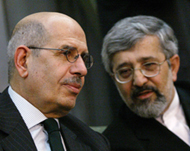Iran faces rising international pressure
Iran has come under increasing international criticism, including from allies Russia and China, after announcing it has enriched uranium for the first time.

But Tehran insists it will push ahead to expand the programme the United Nations has demanded it should scrap.
Russia and China have been Iran’s top defenders at the UN Security Council, resisting pressure to impose sanctions on Tehran for its nuclear programme.
Both countries repeated their stance on Wednesday that negotiations were the way out of the stand-off, but their frustration with Tehran was clear.
Wang Guangya, China’s ambassador to the UN, said his country was “concerned about the events and the way that things are developing because … what they announced, certainly, actually, it is not in line with what is required of them by the international community”.
Mikhail Kamynin, the Russian foreign ministry spokesman, said: “We believe that this step is wrong. It runs counter to decisions of the IAEA (the International Atomic Energy Agency) and resolutions of the UN Security Council.”
|
“Today, our enemies are angry because they could not block the path of our nation towards achieving nuclear technology. We have passed a main crossroad in this path” Mahmoud Ahmadinejad, |
However, Sergey Lavrov, the Russian foreign minister, warned against dramatising the situation and reiterated Moscow’s firm opposition to any military action against Iran.
In Berlin, the government of Angela Merkel, the German chancellor, also said Iran’s announcement was a cause for concern.
Thomas Steg, a government spokesman, said: “It is another step in the wrong direction by Iran.”
Jean-Francois Cope, the French government spokesman, said: “We are in the process of diplomatic regulation of this affair. We call on Iran to respect its obligations.”
Defiance
But Mahmoud Ahmadinejad, the Iranian president, who a day earlier announced the successful enrichment, dismissed the criticism from the US and Europe.
“Today, our enemies are angry because they could not block the path of our nation towards achieving nuclear technology,” he said.
“We have passed a main crossroad in this path.”
Ahmadinejad’s speech on Wednesday was broadcast on state-run television.
The UN Security Council has demanded that Iran should stop all enrichment activity by April 28 because of suspicions the programme aims to make nuclear weapons.
ElBaradei visit
Mohamed ElBaradei, director-general of the IAEA, arrived in Iran on Thursday before talks aimed at resolving the stand-off.
 |
|
ElBaradei (L) is in Iran to ask it to |
Condoleezza Rice, the US secretary of state, telephoned ElBaradei to ask him to reinforce demands that Iran should comply with its nonproliferation requirements.
“This is not a question of Iran’s right to civil nuclear power,” she said.
“This is a question of … the world does not believe that Iran should have the capability and the technology that could lead to a nuclear weapon.”
ElBaradei has said he wants Iran to suspend uranium enrichment, and also hopes parties in the nuclear dispute would return to talks.
But discussions scheduled for Thursday in Iran will be overshadowed by Tehran’s plan to raise enrichment to an industrial scale.
Diplomats at the Security Council said the five permanent council members plus Germany would meet in Moscow next week alongside a Group of Eight meeting to discuss Iran.
The diplomats said the council was unlikely to take any substantive action until ElBaradei had made his report at the end of April.